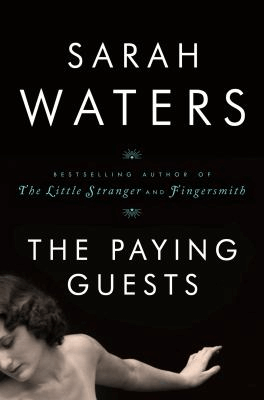Whenever library workers chat with you about reading, we try to figure out what kind of book you’ll like so we know what to recommend. We ask you a lot of questions designed to tease out certain kinds of information we call “appeal factors.” That’s fancy library lingo for “must-haves and deal-breakers” and they’re different from person to person.
Some readers care about the plot: how exciting it is, whether or not it makes sense, and–in the case of mystery readers—how hard it is to figure out whodunit. Others insist on complex characters, both likable ones and those you love to hate. You get the idea. The thing that makes or breaks a book for me personally is the pacing: if it’s not hitting certain dramatic beats in what I consider a timely fashion, I just can’t finish it. Usually this happens when a book is moving too slowly: there’s a big difference between tease and snooze, and some authors haven’t figured it out.

Sarah Waters is not one of those authors. I’ve just finished part one of The Paying Guests and am impressed with how well it’s put together. In fact, its three-part structure and gradually unfolding action lend itself nicely to filming; I wouldn’t be surprised to see a TV version on PBS or BBC America at some point, particularly since it’s set in the same time period as Downton Abbey, and would have, I think, massive crossover appeal.
It’s helpful that the protagonist, Frances Wray, is both sympathetic and interesting: a young woman who’s quietly sacrificed all of her own dreams and desires to take care of her elderly mother. She’s not a martyr about it; in fact, she’s extremely practical and pretty much resigned to her losses (which include both brothers, killed in WWI). Because they’re a bit down on their luck after the death of Mr. Wray, Frances and her mother rent out part of their home to a young married couple, Leonard and Lilian Barber. After the Barbers move in, however, Frances finds a passion for life … and Lilian.
Frances and Lilian’s feelings for each other unfold at just the right pace. There’s an art to these things, and Waters understands it. Given the time period, and the fact that Lilian appears to be happily married when we first meet her, it would be absurd if they fell into each others’ arms immediately. Frances doesn’t even notice anything special about Lilian the day the Barbers move in; she’s annoyed that the Wray finances are so bad they have to share their house with others (something that’s definitely Not Done in their social circles). Frances’s slow warm-up, and Lilian’s even slower thaw, thread the narrative with a delicious energy: are they going to get together, or not?
Waters makes the sensible choice to answer this question, and raise new ones, by the end of Part One. This works well because dragging out the will-they-or-won’t-they question over the course of a 500+ page novel is both cruel and unfair (there’s a difference between tease and torture, too). The resolution of Part One ups the ante for Part Two, creating even more tension with new questions: what obstacles will Frances face going forward? Will Lilian hold to her decision, or choose a different road? Is Leonard going to find out about any of this, and what will he do if he does? And what role will poor Mrs. Wray play as the action unfolds? Though she’s a somewhat minor character, she’s still got the potential to be either an obstacle or a gateway to happiness, and it’s exciting to wonder which way it will go.
I’m indulging myself in a little more speculation and dramatic tension before I dive into Part Two; honestly, by the time I finished Part One I needed to stop and catch my breath. If this kind of reading experience sounds fun to you, and you’d like to spend some time in post-WWI London with a pair of conflicted young women from different social classes, you’ll really enjoy The Paying Guests, which you can read in print, large print, audio book, and digital audio. I’m tempted to try an audio option next, to compare/contrast; I’m a bit fussier about pacing in audio, though, because I can’t control the speed at which the narrator reads. Still, the story’s so good, it’s worth a shot.
What makes or breaks a book for you? What does a story absolutely have to have in terms of character, plot, pacing, setting, etc. for you to really enjoy it? What else can we call “appeal factors” so they don’t sound quite so formal and stuffy? Let us know what you think in a comment below!
-Leigh Anne
Don’t Forget to Pace Yourself!
Request The Paying GuestsLeigh Anne recommends good books and outwits Google daily. If you hear anybody singing or whistling in the stacks, it’s probably her.
